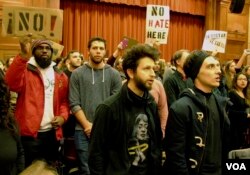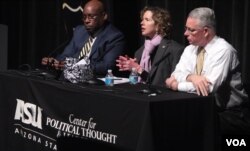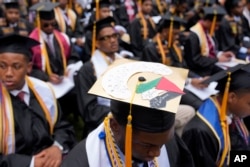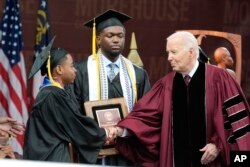Student Union
Should Only Some Speech Be Allowed on Campus?
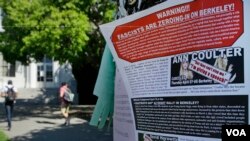
Last month, a student group at Vermont’s Middlebury College invited Charles Murray, a political scientist and fellow at the prestigious conservative think tank American Enterprise Institute, to speak on campus.
Murray was greeted by hundreds of protesters who shouted over him when he tried to speak. As the crowd refused to let up, college administrators escorted Murray to another building where he conducted his talk, with Middlebury professor Allison Stanger, via livestream.
As Stanger and Murray left the building, they were “physically and violently confronted by a group of protesters,” college spokesman Bill Burger said in a statement.
Protesters “violently set upon [their] car, rocking it, pounding on it, jumping on and trying to prevent it from leaving campus,” Burger said.
Stanger was treated at a hospital emergency room and left wearing a neck brace following the violent confrontation with protesters, one of whom grabbed her by the hair and yanked her backward.
“I feared for my life,” Stanger later wrote in a post on Facebook.
Earlier this month, students at Claremont McKenna College in California targeted Heather Mac Donald, a Manhattan Institute scholar and prominent critic of the Black Lives Matter movement, with mob violence in response to her attempted speech.
MacDonald, who was also invited to speak on campus by a student group, saw protesters physically block the doors to the building where she was scheduled to speak. She was forced to deliver the speech via livestream, to a largely empty room, as the protesters refused to allow anyone to pass.
The protesters banged on windows and shouted from outside the building until “the cops decided that things were getting too chaotic and I should stop speaking," MacDonald later said of the incident.
Police officers then had to sneak MacDonald out the building’s back door so she could safely escape the protesters.
Following MacDonald’s doomed speech, more than two dozen students signed an open letter to one of the school’s president’s, David Oxtoby, assailing MacDonald as a “fascist” and a “white supremacist” and demanding Claremont “take action” against an independent student newspaper for its coverage of the protests and its “continual perpetuation of hate speech.”
“Why are you, and other persons in positions of power at these institutions, protecting a fascist and her hate speech and not students that are directly affected by her presence?” the students asked of Oxtoby.
Oxtoby had previously condemned the protests and defended MacDonald’s right to speak on campus, citing the college’s commitment to “the exercise of free speech and academic freedom.”
The students argued that MacDonald is a well-known figure, with her views well-documented, so refusing her a platform to speak didn’t violate her rights. Further, the students said, they consider MacDonald’s mere presence on campus “a form of violence.”
Incidents like the ones at Middlebury and Claremont have become increasingly common on American college campuses, according to Will Creeley, senior vice president of legal and public advocacy at the Foundation for Individual Rights in Education (FIRE), a group promoting free speech for college students.
“It’s deeply troubling,” he told VOA in an interview. “We have seen an unfortunate outbreak of violence in response to controversial speakers on campus.”
He said the violence is driven largely by a perceived lack of consequences for violent actors and a lack of knowledge among students of basic speech laws in the United States.
“Capitulating to threats of violence only goes to further embolden that illiberal response,” Creeley said. “Violence at these events will beget more violence and we are seriously concerned that someone is going to get hurt.”
In a 2015 YouGov survey, 43 percent of students said, “Making sure that students have an environment free from discrimination, even if that means placing some limits on what students can say” should be more of a priority for colleges than protecting the “absolute right to free speech.”
A similar 2016 survey conducted by Gallup shows that, by a 52 percent to 42 percent margin, students believe that their institution should forbid people from speaking on campus who have a history of engaging in “hate speech.”
But, as Creeley told VOA, “there is no hate speech exception to the First Amendment.
“There is an unfortunately prevalent problem of students being unaware of the extent of their rights and the rights of their peers,” he said.
This discussion over First Amendment rights came to a head this week when the University of California-Berkeley preemptively cancelled a scheduled speaking event by conservative provocateur Ann Coulter, citing concerns that the school couldn’t control a potentially violent reaction to Coulter’s presence.
The cancellation followed several violent incidents on the Berkeley campus this year, including a riot in February when far-right journalist Milo Yiannopoulos was invited to speak. That incident resulted in more than $100,000 of damage to buildings on campus.
The school’s decision to cancel Coulter touched off a firestorm of controversy, leading Berkeley to reverse its move and reschedule Coulter’s talk at a time when less people would be on campus. This didn’t sit well with the student group that invited Coulter to campus, so, on Monday, they filed a lawsuit against the school alleging discrimination against the speaker.
“This case arises from efforts by one of California’s leading public universities, UC Berkeley – once known as the “birthplace of the Free Speech Movement” – to restrict and stifle the speech of conservative students whose voices fall beyond the campus political orthodoxy,” the lawsuit, filed by Harmeet Dhillon on behalf of the Berkeley College Republicans, reads.
A spokeswoman for the school, Diane Klein, called the allegation that Coulter is being unfairly punished for her political point of view “untrue.”
“The university welcomes speakers of all political viewpoints and is committed to providing a forum to enable Ann Coulter to speak on the Berkeley campus,” she said in a statement.
The university offered to let Coulter speak May 2, but Dhillon said this time slot is unacceptable, because students will be studying for finals.
Please leave a comment here, and visit us on Facebook, Twitter, Instagram and LinkedIn, thanks!
See all News Updates of the Day
- By VOA News
Siblings flourish at University of Cincinnati
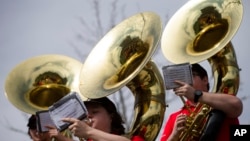
Two sets of siblings -- on from Kuwait and one from Saudi Arabia -- talk about their experiences as international students at the University of Cincinnati in the U.S. state of Ohio.
Read the story here. (April 2024)
Pro-Palestinian protesters set up a new encampment at Philadelphia's Drexel University

Pro-Palestinian protesters set up a new encampment at Drexel University in Philadelphia over the weekend, prompting a lockdown of school buildings, a day after authorities thwarted an attempted occupation of a school building at the neighboring University of Pennsylvania campus.
After several hundred demonstrators marched from Philadelphia's City Hall to west Philadelphia on Saturday afternoon, Drexel said in a statement that about 75 protesters began to set up an encampment on the Korman Quad on the campus. About a dozen tents remained Sunday, blocked off by barricades and monitored by police officers. No arrests were reported.
Drexel President John Fry said in a message Saturday night that the encampment "raises understandable concerns about ensuring everyone's safety," citing what he called "many well-documented instances of hateful speech and intimidating behavior at other campus demonstrations." University buildings were "open only to those with clearance from Drexel's Public Safety," he said.
Authorities at Drexel, which has about 22,000 students, were monitoring the demonstration to ensure it was peaceful and didn't disrupt normal operations, and that "participants and passersby will behave respectfully toward one another," Fry said.
"We will be prepared to respond quickly to any disruptive or threatening behavior by anyone," Fry said, vowing not to tolerate property destruction, "harassment or intimidation" of students or staff or threatening behavior of any kind, including "explicitly racist, antisemitic, or Islamophobic" speech. Anyone not part of the Drexel community would not be allowed "to trespass into our buildings and student residences," he said.
On Friday night, members of Penn Students Against the Occupation of Palestine had announced an action at the University of Pennsylvania's Fisher-Bennett Hall, urging supporters to bring "flags, pots, pans, noise-makers, megaphones" and other items.
The university said campus police, supported by city police, removed the demonstrators Friday night, arresting 19 people, including six University of Pennsylvania students. The university's division of public safety said officials found "lock-picking tools and homemade metal shields," and exit doors secured with zip ties and barbed wire, windows covered with newspaper and cardboard and entrances blocked.
Authorities said seven people arrested would face felony charges, including one accused of having assaulted an officer, while a dozen were issued citations for failing to disperse and follow police commands.
The attempted occupation of the building came a week after city and campus police broke up a two-week encampment on the campus, arresting 33 people, nine of whom were students and two dozen of whom had "no Penn affiliation," according to university officials.
On Sunday, dozens of George Washington University graduates walked out of commencement ceremonies, disrupting university President Ellen Granberg's speech, in protest over the ongoing siege of Gaza and last week's clearing of an on-campus protest encampment that involved police use of pepper spray and dozens of arrests.
The ceremony, at the base of the Washington Monument, started peacefully with fewer than 100 protesters demonstrating across the street in front of the Museum of African American History and Culture. But as Granberg began speaking, at least 70 students among the graduates started chanting and raising signs and Palestinian flags. The students then noisily walked out as Granberg spoke, crossing the street to a rapturous response from the protesters.
Students and others have set up tent encampments on campuses around the country to protest the Israel-Hamas war, pressing colleges to cut financial ties with Israel. Tensions over the war have been high on campuses since the fall but demonstrations spread quickly following an April 18 police crackdown on an encampment at Columbia University.
Nearly 3,000 people have been arrested on U.S. campuses over the past month. As summer break approaches, there have been fewer new arrests and campuses have been calmer. Still, colleges have been vigilant for disruptions to commencement ceremonies.
President Joe Biden told the graduating class at Morehouse College on Sunday, which included some students wearing keffiyeh scarves around their shoulders on top of their black graduation robes, that he heard their voices of protest and that scenes from the conflict in Gaza have been heartbreaking. Biden said given what he called a "humanitarian crisis" there, he had called for "an immediate cease-fire" and return of hostages taken by Hamas.
The latest Israel-Hamas war began when Hamas and other militants stormed into southern Israel on Oct. 7, killing around 1,200 people and taking an additional 250 hostage. Palestinian militants still hold about 100 captives, while Israel's military offensive has left more than 35,000 people in Gaza dead, according to the territory’s health ministry, which doesn't distinguish between civilians and combatants.
Biden tells Morehouse graduates that he hears their voices of protest over war in Gaza
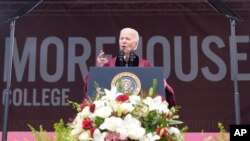
President Joe Biden on Sunday told the graduating class at Morehouse College that he heard their voices of protest over the Israel-Hamas war, and that scenes from the conflict in Gaza have been heartbreaking.
"I support peaceful nonviolent protest," he told students, some who wore keffiyeh scarves around their shoulders on top of their black graduation robes. "Your voices should be heard, and I promise you I hear them."
The president told the crowd that it was a "humanitarian crisis in Gaza, that's why I've called for an immediate cease-fire to stop the fighting" and bring home the hostages taken when Hamas attacked Israel on Oct. 7. The comments, toward the end of his address that also reflected on American democracy and his role in safeguarding it, were the most direct recognition to U.S. students about the campus protests that have swept across the country.
Morehouse's announcement that Biden would be the commencement speaker drew some backlash among the school's faculty and supporters who oppose Biden's handling of the war. Some Morehouse alumni circulated an online letter condemning school administrators for inviting Biden and soliciting signatures to pressure Morehouse President David Thomas to rescind it.
The letter claimed that Biden's approach to Israel amounted to support of genocide in Gaza and was out of step with the pacifism expressed by Martin Luther King Jr., Morehouse's most famous graduate.
The Hamas attack on southern Israel killed 1,200 people. Israel's offensive has killed more than 35,000 Palestinians in Gaza, according to local health officials.
Some members of the graduating class showed support for Palestinians in Gaza by tying keffiyeh scarves around their shoulders on top of their black graduation robes. One student draped himself in a Palestinian flag. On the stage behind the president, academics unfurled a Democratic Republic of Congo flag.
The country has been mired in an ongoing civil war that has plunged the nation into violence and displaced millions of people. Many racial justice advocates have called for greater attention to the conflict and for greater attention in the US to the conflict as well as American aid in ending the violence.
"Thank you God for this 'woke' class of 2024 that is in tune with the zeitgeist, the spirit of the times," the Rev. Claybon Lea Jr. said during a prayer at the start of the commencement.
The class valedictorian, DeAngelo Jeremiah Fletcher, said at the close of his speech that it was his duty to speak on the war in Gaza and that it was important to recognize that both Palestinians and Israelis have suffered.
"From the comfort of our homes, we watch an unprecedented number of civilians mourn the loss of men, women and children, while calling for the release of all hostages he said. "It is my stance as a Morehouse man, nay as a human being, to call for an immediate and permanent cease-fire in the Gaza Strip."
Biden stook and shook his hand after Fletcher finished.
The speech, and a separate one Biden is giving later Sunday in the Midwest, is part of a burst of outreach to Black constituents by the president, who has watched his support among these voters soften since their strong backing helped put him in the Oval Office in 2020.
After speaking at Morehouse in Atlanta, Biden will travel to Detroit to address an NAACP dinner.
Georgia and Michigan are among a handful of states that will help decide November's expected rematch between Biden and Republican former President Donald Trump. Biden narrowly won Georgia and Michigan in 2020 and needs to repeat — with a boost from strong Black voter turnout in both cities.
Biden spent the back end of the past week reaching out to Black constituents. He met with plaintiffs and relatives of those involved in Brown v. Board of Education, the landmark 1954 Supreme Court decision that outlawed racial segregation in public schools. He also met with members of the "Divine Nine" Black fraternities and sororities and spoke with members of the Little Rock Nine, who helped integrate a public school in Little Rock, Arkansas, in 1957.
In Detroit, Biden was set to visit a Black-owned small business before delivering the keynote address at the NAACP's Freedom Fund dinner, which traditionally draws thousands of attendees. The speech gives Biden a chance to reach thousands of people in Wayne County, an area that has historically voted overwhelmingly Democratic but has shown signs of resistance to his reelection bid.
Wayne County also holds one of the largest Arab American populations in the nation, predominantly in the city of Dearborn. Leaders there were at the forefront of an "uncommitted" effort that received over 100,000 votes in the state's Democratic primary and spread across the country.
A protest rally and march against Biden's visit are planned for Sunday afternoon in Dearborn. Another protest rally is expected later that evening outside Huntington Place, the dinner venue.
US remains top choice for Indian students going abroad
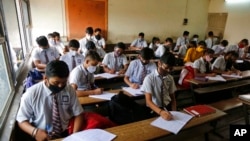
About 69% of Indian students traveling abroad for their studies chose the United States, according to a Oxford International’s Student Global Mobility Index. Other popular choices were the United Kingdom, Canada and Australia.
Education Times reports the main influencers for deciding where to study abroad – for Indian students and others – were parents. (April 2024)
Malaysian official: Schools can’t turn away from global tensions
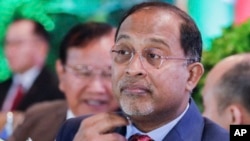
Zambry Abdul Kadir, Malaysia’s higher education minister, said protests spreading across universities in the United States show that schools can’t ignore political tensions.
Helen Packer, reporting in Times Higher Education, said the minister reminded educators that universities are key in the development of leaders, individuals and societies. (April 2024)




